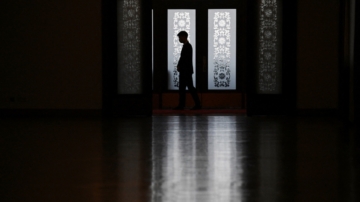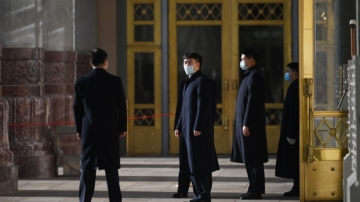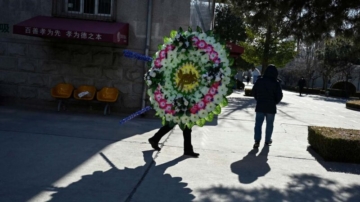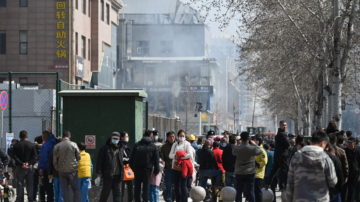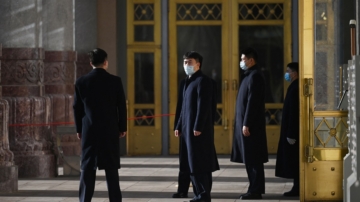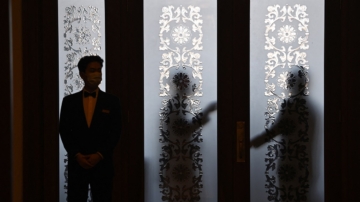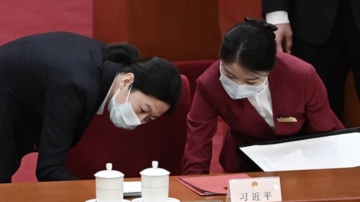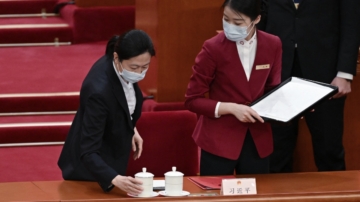【新唐人2013年03月23日讯】今年中共“两会”各级官员的高“反对票”和“弃权票”,历届少有。而政府的多份工作报告,更是创下“反对”的历史记录。事实上,这还是中共担心,准新“上任”领导人得票太低,事先在“高级选民”中,进行秘密预选后的结果。请看报导。
据香港《争鸣》杂志透露,中国新年前夕,中共政治局就对三月初新一届人大、政协“两会”进行工作部署,其中一项就是,就新一届准人大委员长张德江、准国务院总理李克强、准国务院副总理人选,和准全国政协主席俞正声等,进行内部摸底。
有关预选工作是在保密情况下展开,时间从1月28号到2月2号。
有资格充任“高级选民”的高官包括:中央委员、候补中央委员、中纪委员共471人﹔省部一级党委(组)成员498人;全国人大常委、省级人大主任、副主任361人;全国政协常委、省级政协主席、副主席及各民主党派中央成员515人;省级政府省(市)长、副省(市)长181人,共计2026人。
文章披露,在预选投票结果出来后,中共政治局常委及中央政治局对“反对”和“弃权”之高,感到震惊和焦虑。
文章感叹:准领导人在中共最高层内部得到这样的得票率,“实乃天下奇闻”。
而在“两会”的实际选举中,有一些官员的得票率仍不理想:环境保护部长周生贤获得了171张反对票和47张弃权票;住房和城乡建设部长姜伟新则有181张反对票和36张弃权票;而人大常委委员朱国萍更是获得了986张反对票,296张弃权票。其他像教育部长、央行行长反对票也都是过百。
独立评论员邢天行:“保密预选实际上就是怕露丑。因为在以前的时候,历次选举当中,没有像这次两会期间发生这么大量的弃权、反对这样的票,一般都是同意,所以,他们没有想到会这样,给大家一定的公开,选票出来之后,成为大家笑话的对像了。”
邢天行指出,中共又想维持专制体制,又想装民主,看来是不成功。
唯一连任十二届人大代表的申纪兰,被称为“人代活化石”。早在2010年,申纪兰就表示:当代表就是要听党的话,她从来没有投过反对票。申纪兰的其他语言也很雷人,她说:“我们是民主选举,我不跟选民交流”。
时事评论员兰述认为,中共的选举,实际就是各个利益集团瓜分国家权利的过程,所谓的“两会”,是用国家法律的形式,让中共内部各个利益集团代理人的权利合法化,所以要保证代理人都当选。
时事评论员兰述:“党内有一个非常重要的利益集团没有得到它所得到的利益,那么将来的执政是有危机的。所以当他得票太低的时候,其他的几个派系还要去帮忙给他投票,让他通过的。只有这样做,才能达到党内各个派系的利益均衡。”
不过,还是有人对这次的人大选举提出了质疑。
日前,浙江杭州律师王成,向最高法院寄发一份起诉状,要求确认“张德江、王胜俊等人当选人大正、副委员长,因违反《宪法》中第65和103条而无效。”
而,这次“两会”多份政府报告的表决结果更令人意外:最高人民法院的工作报告反对票高达605张,弃权票120张;最高人民检察院的工作报告也有485张反对票,弃权票121张;而中央及地方政府预算草案有509票反对,127票弃权。反对票数量和比例,都创下近年来的最高记录。
采访/陈汉 编辑/宋风 后制/钟元
High Records of Against and Abstentions
In 2013, the Chinese Communist Party (CCP) officials at
all levels, during the two sessions,
had an unprecedented high volume of
against and abstention, votes.
Multiple government work reports have set new
historical records of against.
However, because the CCP feared the
prospective leaders won too few votes,
it had already done a secret pre-selection among
'senior voters' in advance. Let's see the reports.
According to Hong Kong's Cheng Ming magazine,
before the Chinese New Year,
the CCP Politburo had started arrangements for the
new session of the National People's Congress, NPC,
and the two sessions of CPPCC in early March.
One task was to thoroughly investigate Zhang Dejiang,
quasi-chairman of NPC, quasi-Premier Li Keqiang,
the quasi-vice prime minister and Yu Zhengsheng,
the quasi-chairman of the CPPCC, internally.
The pre-selection was done in secret from
January 28th to February 2nd.
Qualified 'senior voters' include 471 members and
alternate members of the Central Committee and the Central Commission for Discipline Inspection;
498 provincial and ministerial-level
party committees (group) members;
361 members of Standing Committee of the NPC,
the provincial NPC directors and deputy directors;
515 standing committee members of the CPPCC,
the provincial CPPCC chairmen and deputy Chairmen,
and members of central committees of democratic parties;
181 provincial governors and deputy governors,
mayors and vice mayors. It is in total 2,026 people.
The article revealed that after the pre-selection voting
results came out, the CCP Politburo Standing Committee and
the Political Bureau of the Central Committee were shocked
and worried about the high volume of against and abstention votes.
The article lamented that the quasi-leaders at the highest
level of the CCP had so few votes, “It's mind blowing.”
In the real election of the two sessions,
some officials' votes were still not enough.
Zhou Shengxian, Environmental Protection Minister,
had 171 against and 47 abstentions;
Jiang Weixin, Minister of Housing and Urban and
Rural Construction had 181 against and 36 abstentions;
Zhu Guoping, member of Standing Committee of
NPC had 986 against 296 abstentions.
Minister of Education, the central bank governor
also had over 100 against votes each.
Independent commentator Xing Tianxing: “Confidential pre-
selection is actually being afraid of being embarrassed in public.
In previous elections, there were no such
high levels of against and abstentions.
They were generally agreed. They did not think once of
giving any publicity, the results were a joke.”
Xing Tianxing pointed out the CCP wants to maintain its
authoritarian regime, and pretends to have democracy, which appears to be unsuccessful.
The only consecutive NPC representative is Shen Jilan,
known as the living fossil to generations of humanity.
As early as in 2010, Shen Jilan said to be a representative
is to listen to the CCP, and she had never casted against vote.
Shen Jilan's other comments were also very shocking,
she said: "We are democratically elected, so I did not communicate with voters.”
Political commentator Lan Shu said that the CCP election is
actually various self-interest groups carveing up national interests.
The so-called two sessions, uses the form of national law
to legalize the rights of the agents of various interest groups,
so they had to ensure their agents are elected.
Lan Shu: "If there is any important interest group
within the CCP that does not get elected,
then the future ruling is in a crisis. So when votes are too low,
the other several factions also lend a hand and vote for it,
and let him pass. Only in this way can it achieve the balance
of interests among various factions of the CCP."
However, people still questioned the election of the NPC.
Recently, Wang Cheng, an attorney in Hangzhou, Zhejiang
Province, sent to the Supreme Court a bill of complaint,
and asked for confirmation that “Zhang Dejiang,
Wang Shengjun, and other people being elected to the NPC
chairman and vice chairmanship are invalid because of
violation of the Constitution, Article 65 and 103.”
The government reports of the two sessions'
voting results are more surprising.
The work report of the Supreme People's Court
had up to 605 against votes and 120 abstentions;
the work report of the Supreme People's Procurator
had 485 against and 121 abstentions;
draft budget of the central and local governments
had 509 against and 127 abstentions.
Against votes number and proportion
are the highest on record in recent years.
据香港《争鸣》杂志透露,中国新年前夕,中共政治局就对三月初新一届人大、政协“两会”进行工作部署,其中一项就是,就新一届准人大委员长张德江、准国务院总理李克强、准国务院副总理人选,和准全国政协主席俞正声等,进行内部摸底。
有关预选工作是在保密情况下展开,时间从1月28号到2月2号。
有资格充任“高级选民”的高官包括:中央委员、候补中央委员、中纪委员共471人﹔省部一级党委(组)成员498人;全国人大常委、省级人大主任、副主任361人;全国政协常委、省级政协主席、副主席及各民主党派中央成员515人;省级政府省(市)长、副省(市)长181人,共计2026人。
文章披露,在预选投票结果出来后,中共政治局常委及中央政治局对“反对”和“弃权”之高,感到震惊和焦虑。
文章感叹:准领导人在中共最高层内部得到这样的得票率,“实乃天下奇闻”。
而在“两会”的实际选举中,有一些官员的得票率仍不理想:环境保护部长周生贤获得了171张反对票和47张弃权票;住房和城乡建设部长姜伟新则有181张反对票和36张弃权票;而人大常委委员朱国萍更是获得了986张反对票,296张弃权票。其他像教育部长、央行行长反对票也都是过百。
独立评论员邢天行:“保密预选实际上就是怕露丑。因为在以前的时候,历次选举当中,没有像这次两会期间发生这么大量的弃权、反对这样的票,一般都是同意,所以,他们没有想到会这样,给大家一定的公开,选票出来之后,成为大家笑话的对像了。”
邢天行指出,中共又想维持专制体制,又想装民主,看来是不成功。
唯一连任十二届人大代表的申纪兰,被称为“人代活化石”。早在2010年,申纪兰就表示:当代表就是要听党的话,她从来没有投过反对票。申纪兰的其他语言也很雷人,她说:“我们是民主选举,我不跟选民交流”。
时事评论员兰述认为,中共的选举,实际就是各个利益集团瓜分国家权利的过程,所谓的“两会”,是用国家法律的形式,让中共内部各个利益集团代理人的权利合法化,所以要保证代理人都当选。
时事评论员兰述:“党内有一个非常重要的利益集团没有得到它所得到的利益,那么将来的执政是有危机的。所以当他得票太低的时候,其他的几个派系还要去帮忙给他投票,让他通过的。只有这样做,才能达到党内各个派系的利益均衡。”
不过,还是有人对这次的人大选举提出了质疑。
日前,浙江杭州律师王成,向最高法院寄发一份起诉状,要求确认“张德江、王胜俊等人当选人大正、副委员长,因违反《宪法》中第65和103条而无效。”
而,这次“两会”多份政府报告的表决结果更令人意外:最高人民法院的工作报告反对票高达605张,弃权票120张;最高人民检察院的工作报告也有485张反对票,弃权票121张;而中央及地方政府预算草案有509票反对,127票弃权。反对票数量和比例,都创下近年来的最高记录。
采访/陈汉 编辑/宋风 后制/钟元
High Records of Against and Abstentions
In 2013, the Chinese Communist Party (CCP) officials at
all levels, during the two sessions,
had an unprecedented high volume of
against and abstention, votes.
Multiple government work reports have set new
historical records of against.
However, because the CCP feared the
prospective leaders won too few votes,
it had already done a secret pre-selection among
'senior voters' in advance. Let's see the reports.
According to Hong Kong's Cheng Ming magazine,
before the Chinese New Year,
the CCP Politburo had started arrangements for the
new session of the National People's Congress, NPC,
and the two sessions of CPPCC in early March.
One task was to thoroughly investigate Zhang Dejiang,
quasi-chairman of NPC, quasi-Premier Li Keqiang,
the quasi-vice prime minister and Yu Zhengsheng,
the quasi-chairman of the CPPCC, internally.
The pre-selection was done in secret from
January 28th to February 2nd.
Qualified 'senior voters' include 471 members and
alternate members of the Central Committee and the Central Commission for Discipline Inspection;
498 provincial and ministerial-level
party committees (group) members;
361 members of Standing Committee of the NPC,
the provincial NPC directors and deputy directors;
515 standing committee members of the CPPCC,
the provincial CPPCC chairmen and deputy Chairmen,
and members of central committees of democratic parties;
181 provincial governors and deputy governors,
mayors and vice mayors. It is in total 2,026 people.
The article revealed that after the pre-selection voting
results came out, the CCP Politburo Standing Committee and
the Political Bureau of the Central Committee were shocked
and worried about the high volume of against and abstention votes.
The article lamented that the quasi-leaders at the highest
level of the CCP had so few votes, “It's mind blowing.”
In the real election of the two sessions,
some officials' votes were still not enough.
Zhou Shengxian, Environmental Protection Minister,
had 171 against and 47 abstentions;
Jiang Weixin, Minister of Housing and Urban and
Rural Construction had 181 against and 36 abstentions;
Zhu Guoping, member of Standing Committee of
NPC had 986 against 296 abstentions.
Minister of Education, the central bank governor
also had over 100 against votes each.
Independent commentator Xing Tianxing: “Confidential pre-
selection is actually being afraid of being embarrassed in public.
In previous elections, there were no such
high levels of against and abstentions.
They were generally agreed. They did not think once of
giving any publicity, the results were a joke.”
Xing Tianxing pointed out the CCP wants to maintain its
authoritarian regime, and pretends to have democracy, which appears to be unsuccessful.
The only consecutive NPC representative is Shen Jilan,
known as the living fossil to generations of humanity.
As early as in 2010, Shen Jilan said to be a representative
is to listen to the CCP, and she had never casted against vote.
Shen Jilan's other comments were also very shocking,
she said: "We are democratically elected, so I did not communicate with voters.”
Political commentator Lan Shu said that the CCP election is
actually various self-interest groups carveing up national interests.
The so-called two sessions, uses the form of national law
to legalize the rights of the agents of various interest groups,
so they had to ensure their agents are elected.
Lan Shu: "If there is any important interest group
within the CCP that does not get elected,
then the future ruling is in a crisis. So when votes are too low,
the other several factions also lend a hand and vote for it,
and let him pass. Only in this way can it achieve the balance
of interests among various factions of the CCP."
However, people still questioned the election of the NPC.
Recently, Wang Cheng, an attorney in Hangzhou, Zhejiang
Province, sent to the Supreme Court a bill of complaint,
and asked for confirmation that “Zhang Dejiang,
Wang Shengjun, and other people being elected to the NPC
chairman and vice chairmanship are invalid because of
violation of the Constitution, Article 65 and 103.”
The government reports of the two sessions'
voting results are more surprising.
The work report of the Supreme People's Court
had up to 605 against votes and 120 abstentions;
the work report of the Supreme People's Procurator
had 485 against and 121 abstentions;
draft budget of the central and local governments
had 509 against and 127 abstentions.
Against votes number and proportion
are the highest on record in recent years.

